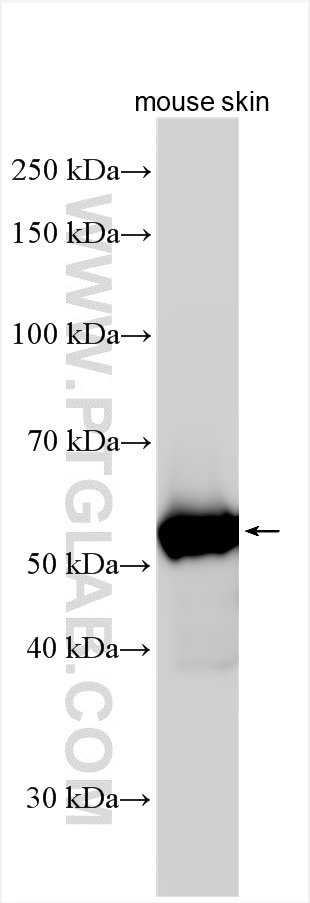Anticorps Polyclonal de lapin anti-Cytokeratin 71
Cytokeratin 71 Polyclonal Antibody for WB, ELISA
Hôte / Isotype
Lapin / IgG
Réactivité testée
Humain, souris
Applications
WB, ELISA
Conjugaison
Non conjugué
N° de cat : 26149-1-AP
Synonymes
Galerie de données de validation
Applications testées
| Résultats positifs en WB | tissu cutané de souris, |
Dilution recommandée
| Application | Dilution |
|---|---|
| Western Blot (WB) | WB : 1:500-1:2000 |
| It is recommended that this reagent should be titrated in each testing system to obtain optimal results. | |
| Sample-dependent, check data in validation data gallery | |
Informations sur le produit
26149-1-AP cible Cytokeratin 71 dans les applications de WB, ELISA et montre une réactivité avec des échantillons Humain, souris
| Réactivité | Humain, souris |
| Hôte / Isotype | Lapin / IgG |
| Clonalité | Polyclonal |
| Type | Anticorps |
| Immunogène | Cytokeratin 71 Protéine recombinante Ag23536 |
| Nom complet | keratin 71 |
| Poids moléculaire observé | 57 kDa |
| Numéro d’acquisition GenBank | BC103917 |
| Symbole du gène | KRT71 |
| Identification du gène (NCBI) | 112802 |
| Conjugaison | Non conjugué |
| Forme | Liquide |
| Méthode de purification | Purification par affinité contre l'antigène |
| Tampon de stockage | PBS with 0.02% sodium azide and 50% glycerol |
| Conditions de stockage | Stocker à -20°C. Stable pendant un an après l'expédition. L'aliquotage n'est pas nécessaire pour le stockage à -20oC Les 20ul contiennent 0,1% de BSA. |
Informations générales
KRT71 is a gene that encodes Keratin 71, a type II intermediate filament protein primarily expressed in the inner root sheath (IRS) of hair follicles. As a member of the keratin family, KRT71 plays a critical role in maintaining the structural integrity of hair shafts and follicular tissues. Mutations in this gene have been linked to hereditary hair disorders, including autosomal recessive woolly hair (ARWH) and hypotrichosis, characterized by abnormal hair texture, density, or growth patterns.
Protocole
| Product Specific Protocols | |
|---|---|
| WB protocol for Cytokeratin 71 antibody 26149-1-AP | Download protocol |
| Standard Protocols | |
|---|---|
| Click here to view our Standard Protocols |


